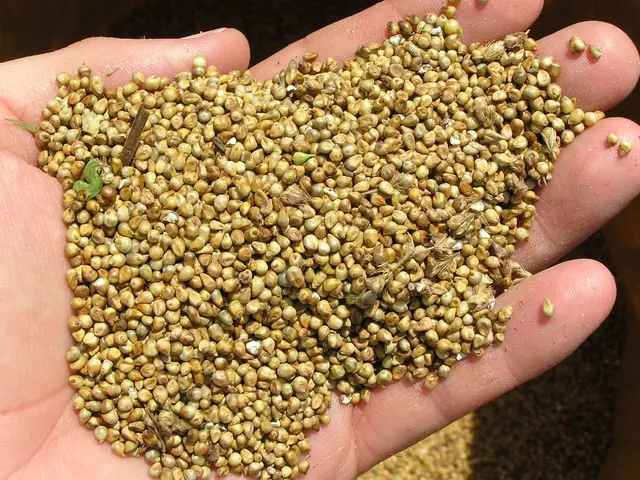Exploring the Global Use of Herbal Medicines to Combat Mental Deterioration
Herbal remedies are increasingly being recognised as part of a broader approach to health, rather than a cure-all solution. When combined with a healthy lifestyle, including a balanced diet, regular exercise, and adequate sleep, these natural substances can offer potential benefits for cognitive function.
Among the herbs we've researched, Ginkgo Biloba and Brahmi (Bacopa monnieri) stand out for their robust clinical evidence supporting their use for cognitive decline.
Ginkgo Biloba has been found to improve memory and cognitive function, particularly selective attention and mental recall. Some studies suggest it benefits people with memory disorders and age-related decline, with effects on both verbal and non-verbal memory [4].
Brahmi (Bacopa monnieri), on the other hand, contains active compounds called bacosides that promote neuronal repair, improve synaptic communication, reduce oxidative stress in brain regions essential to memory (frontal cortex and hippocampus), and may improve learning, focus, and memory [1][3][4]. It also possesses adaptogenic properties that help reduce stress, which can indirectly support cognition.
Other herbs in our list, such as Sage, Lemon Balm, Green Tea, Maca Root, Rooibos, and Gotu Kola, while having potential cognitive benefits, lack strong definitive clinical evidence on their effectiveness against cognitive decline based on the available information. However, it is known from broader scientific literature that:
- Sage and Lemon Balm have some preliminary evidence indicating potential cognitive benefits, mainly through antioxidant and anti-inflammatory effects.
- Green Tea contains caffeine and antioxidants like catechins which may support brain health and have neuroprotective effects, but evidence specifically for cognitive decline varies.
- Maca Root, Rooibos, and Gotu Kola have various traditional uses and antioxidant properties, but lack strong definitive clinical evidence on cognitive decline based on the available information.
When using herbal remedies, it's essential to be aware of the signs of adverse reactions and to seek medical advice if they occur. It's also crucial to follow recommended dosages for each herb to avoid adverse effects. Herbs should be used with caution, especially when combined with other medications. Always consult with a healthcare professional before combining herbal remedies with medication.
Collaboration between traditional and modern medicine can offer a more comprehensive approach to cognitive health. Many of these herbs also influence neurotransmitter activity, vital for memory, mood, and cognitive functions.
In summary, Ginkgo Biloba and Brahmi have the most robust clinical evidence supporting their use for cognitive decline, showing benefits for memory, learning, and brain function, often linked to antioxidant, neuroprotective, and neurotransmitter-modulating effects [1][3][4]. For the others, more high-quality clinical trials are needed to confirm any direct cognitive benefits.
- The cognitive benefits of Ginkgo Biloba extend beyond memory improvement, also affecting selective attention and mental recall.
- Brahmi, or Bacopa monnieri, reduces oxidative stress in brain regions essential to memory and improves learning, focus, and memory thanks to its bacosides.
- While Sage and Lemon Balm have preliminary evidence suggesting potential cognitive benefits, their effectiveness against cognitive decline is not yet solidified.
- Green Tea may support brain health and have neuroprotective effects, but the evidence for cognitive decline specifically can vary.
- Maca Root, Rooibos, and Gotu Kola have traditional uses and antioxidant properties, but their effectiveness against cognitive decline is not yet conclusive.
- When using herbal remedies, it's crucial to be aware of potential adverse reactions, follow recommended dosages, and consult a healthcare professional before combining them with medication.
- Collaboration between traditional and modern medicine can provide a more holistic approach to maintaining brain health and mental wellness.
- In addition to cognitive benefits, many of these herbs also influence neurotransmitter activity, which is vital for memory, mood, and cognitive functions.





